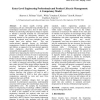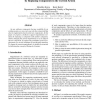3514 search results - page 10 / 703 » Evolving Specification Engineering |
IJMTM
2010
13 years 5 months ago
2010
: In today's rapidly evolving global marketplace, jobs are continually being redefined due to technological innovations and a host of other factors. Workers are also being cal...
HICSS
2007
IEEE
14 years 2 months ago
2007
IEEE
Systems using Software Agents (or Multi-Agent Systems, MAS) are becoming more popular within the development mainstream because, as the name suggests, an Agent aims to handle task...
APSEC
1999
IEEE
14 years 2 days ago
1999
IEEE
As new software components become available for an existing system, we can evolve not only the system itself but also its requirements based on the new components. In this paper, ...
COMPSAC
2006
IEEE
14 years 1 months ago
2006
IEEE
As software systems evolve by adding new extensions some unexpected conflicts may occur, which is known as the Feature Interaction Problem (FIP). FIP is a threat to the dependabil...
SEMWEB
2007
Springer
14 years 1 months ago
2007
Springer
Nowadays it is widely accepted that ontologies, the key technology for the realization of the Semantic Web, are artefacts that are collaboratively and iteratively developed/evolved...



